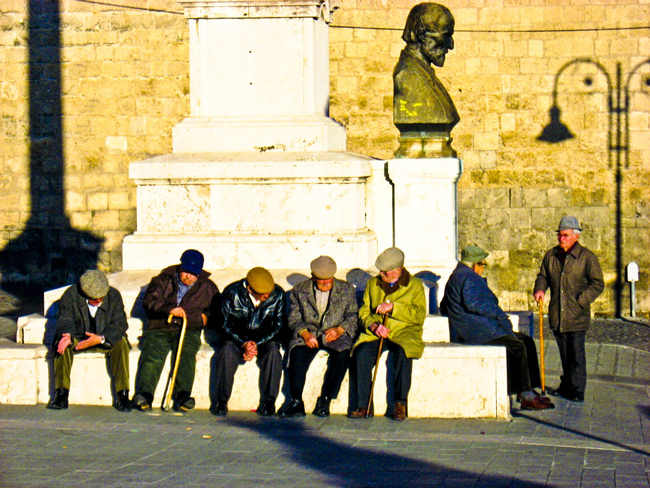
Reaching over to make the bed or bending to get a grocery bag might not be the typical idea of being physically active. But all those everyday movements add up and could contribute to health benefits, especially among older adults — even if it’s not clear just how much energy seniors are exerting.
Previous research has been mostly based on error-prone self-reports of physical activity rather than actual measurements. Now, University of Florida researchers and colleagues have used laboratory-based methods to objectively measure the amount of energy older adults use up as they go about their daily activities, and linked that to cognitive performance.
The researchers found that older adults who expend relatively high amounts of energy in their daily activities are substantially less likely to become cognitively impaired than those who exert less energy. The findings are published in the July 25 issue of the Archives of Internal Medicine.
“There are millions and millions of people who don’t exercise, but we’re beginning to understand that a lot of these people do a lot during the day, and they are likely to accumulate more energy expenditure during the day than others who go out and exercise,” said study co-author Todd Manini, an assistant professor in the department of aging and geriatric research at the University of Florida College of Medicine and the UF Institute on Aging. “These studies are starting to shed light on the fact that accumulating activity during the day can potentially provide health benefits.”
A growing body of research points to the promise of physical activity as a way to prevent or even treat cognitive impairment. But to figure out what types of activities are necessary, and how much, researchers need better estimates of energy spent in various activities.
“That’s going to be a hard question to answer until we can get objective answers about physical activity,” said Kirk Erickson, an assistant professor in the department of psychology and the Center for the Neural Basis of Cognition at the University of Pittsburgh. “If we’re going to translate this research into a clinical setting, we need to provide a quantifiable metric or number for how much physical activity to get.” Erickson was not involved in the current study.
Previous studies have relied heavily on study participants to tell researchers how physically active they were.
“With self-report, we hear what people think they are getting, but it might not be accurate, and doesn’t tell us about energy expenditure the way that objective measures do,” said Erickson, whose imaging studies have shown that one year of participation in modest amounts of exercise can reverse Alzheimer’s-related atrophy in parts of the brain involved in memory formation.
In the new study, the research team, led by scientists at the Heart and Stroke Foundation Centre in Toronto, and at the University of California, San Francisco, moved a step closer to reliably identifying just how much energy people expend.
The researchers studied almost 200 older adults who on average were 75 years old to figure out how much energy people burn during daily activities. First, they calculated the total amount of energy used for the day, then subtracted the basic amount of energy the body needs while at rest.
Participants drank so-called “heavy” water, which has a slight chemical difference from regular water. That allowed researchers to track the body’s consumption of oxygen molecules over time and use that to calculate the number of calories burned.
To find out how much energy a person used while at rest, the researchers used a method called calorimetry to determine the levels of carbon dioxide in the breath.
For comparison, the researchers also collected self-reported activity data.
To assess cognitive function, patients were tested on memory, concentration, orientation, language and other categories.
The more energy spent, the lower the likelihood of cognitive impairment, the researchers found. Patients with the highest levels of activity energy expenditure were 90 percent less likely to become cognitively impaired than those with the lowest levels of expenditure.
The findings are consistent with what other researchers have found, but Manini and colleagues went a step beyond by pointing out the shortcomings associated with using self-reported activity.
Self-reports are highly biased because people might report participating in more activity than they actually do — or they might forget to mention something they did. Self-reports also often focus on sports-like activities and fail to capture movements such as walking around the house or pottering about in the garden.
The link between the onset of cognitive impairment and energy expenditure was stronger when laboratory measurements were used to measure activity than when self-report data was used. In addition, the relationship between the amount of energy spent and the amount of decline experienced was more pronounced for laboratory methods than for self-reports, possibly because of more accurate recording of low-intensity activity.
“The strength of the study was that the researchers didn’t have to just ask people how much physical activity they got — they could actually measure it,” Erickson said.
–University of Florida





























Leave a Reply